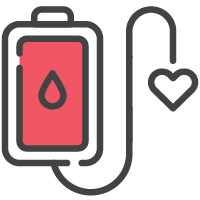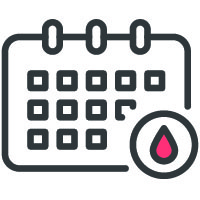
Donating whole blood is an easy way to help us save lives! Here's what to expect when you donate blood with ARUP.
ARUP is the sole blood provider for University of Utah Health hospitals and clinics and the Huntsman Cancer Institute.
Register

- Provide your picture identification at the front desk.
- Read over the donation information the receptionist provides.
- Fill out a registration form.
- If you are 16–17 years old, present your signed parental permission slip.
Learn more about eligibility and qualifications.
Complete a Medical Screening

- A blood center technician will take your vital signs and check your hematocrit (iron) level.
- We will ask some questions about your health in a private setting.
- During this process, you may be temporarily or permanently deferred based on strict FDA guidelines.
Donate

- A medical professional will clean your arm and use a sterile needle for the draw.
- Each needle is discarded after one use!
- Whole blood donations typically take 6–10 minutes.
- We test every donation to identify the ABO and RH blood type.
Refresh and Recover

- Take some free refreshments and relax in the canteen to raise your blood sugar and replenish your fluids.
- After you leave, feel free to resume your normal routine.
Donate Again!

- Give the gift of life by donating whole blood as often as every 56 days.
- You will receive the results of your blood type test.
Learn more about blood types - We will notify you when your blood has been used to save a life.
Check Our Donor Qualifications
To donate blood, you must:
- Be in good health.
- Weigh at least 110 lbs.
- Be at least 18 years old, or 16 with a signed parental permission slip.
- Meet any additional donor qualifications.
Schedule an appointment
Call 801-584-5272 or schedule an appointment.
